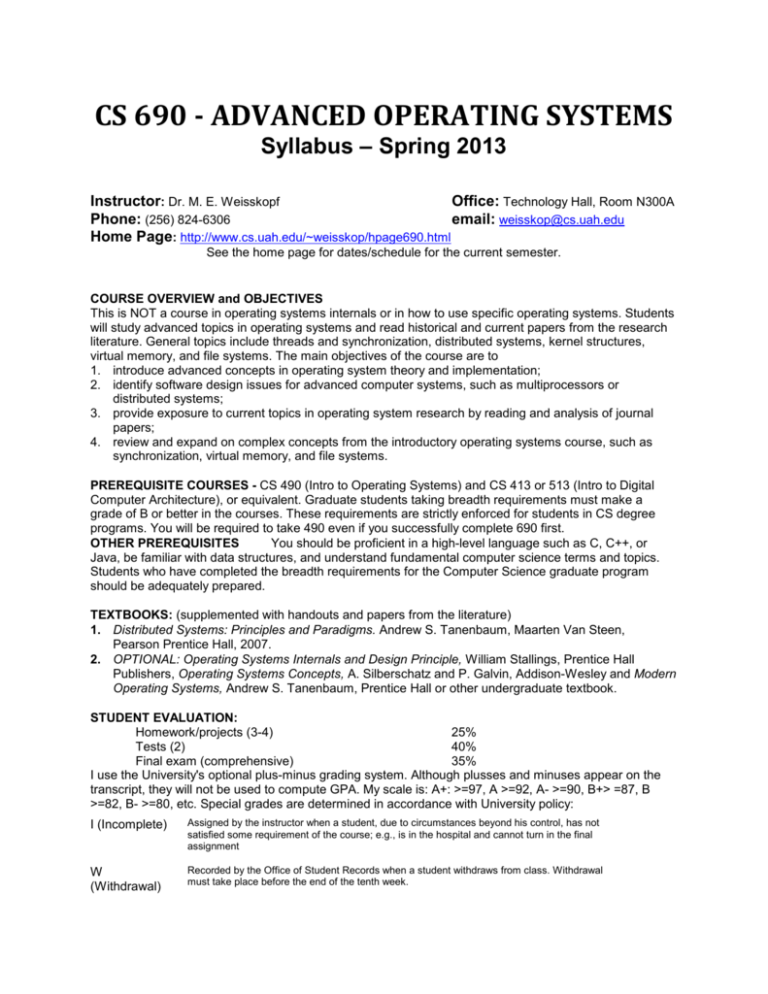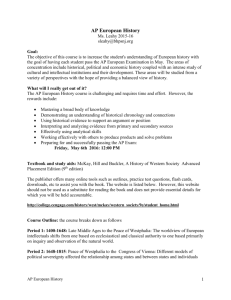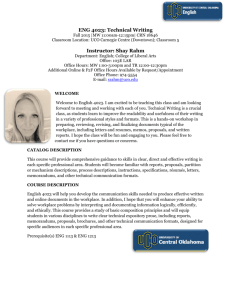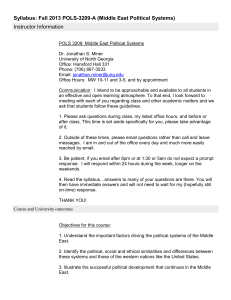
CS 690 - ADVANCED OPERATING SYSTEMS
Syllabus – Spring 2013
Instructor: Dr. M. E. Weisskopf
Office: Technology Hall, Room N300A
Phone: (256) 824-6306
email: weisskop@cs.uah.edu
Home Page: http://www.cs.uah.edu/~weisskop/hpage690.html
See the home page for dates/schedule for the current semester.
COURSE OVERVIEW and OBJECTIVES
This is NOT a course in operating systems internals or in how to use specific operating systems. Students
will study advanced topics in operating systems and read historical and current papers from the research
literature. General topics include threads and synchronization, distributed systems, kernel structures,
virtual memory, and file systems. The main objectives of the course are to
1. introduce advanced concepts in operating system theory and implementation;
2. identify software design issues for advanced computer systems, such as multiprocessors or
distributed systems;
3. provide exposure to current topics in operating system research by reading and analysis of journal
papers;
4. review and expand on complex concepts from the introductory operating systems course, such as
synchronization, virtual memory, and file systems.
PREREQUISITE COURSES - CS 490 (Intro to Operating Systems) and CS 413 or 513 (Intro to Digital
Computer Architecture), or equivalent. Graduate students taking breadth requirements must make a
grade of B or better in the courses. These requirements are strictly enforced for students in CS degree
programs. You will be required to take 490 even if you successfully complete 690 first.
OTHER PREREQUISITES
You should be proficient in a high-level language such as C, C++, or
Java, be familiar with data structures, and understand fundamental computer science terms and topics.
Students who have completed the breadth requirements for the Computer Science graduate program
should be adequately prepared.
TEXTBOOKS: (supplemented with handouts and papers from the literature)
1. Distributed Systems: Principles and Paradigms. Andrew S. Tanenbaum, Maarten Van Steen,
Pearson Prentice Hall, 2007.
2. OPTIONAL: Operating Systems Internals and Design Principle, William Stallings, Prentice Hall
Publishers, Operating Systems Concepts, A. Silberschatz and P. Galvin, Addison-Wesley and Modern
Operating Systems, Andrew S. Tanenbaum, Prentice Hall or other undergraduate textbook.
STUDENT EVALUATION:
Homework/projects (3-4)
25%
Tests (2)
40%
Final exam (comprehensive)
35%
I use the University's optional plus-minus grading system. Although plusses and minuses appear on the
transcript, they will not be used to compute GPA. My scale is: A+: >=97, A >=92, A- >=90, B+> =87, B
>=82, B- >=80, etc. Special grades are determined in accordance with University policy:
I (Incomplete)
Assigned by the instructor when a student, due to circumstances beyond his control, has not
satisfied some requirement of the course; e.g., is in the hospital and cannot turn in the final
assignment
W
(Withdrawal)
Recorded by the Office of Student Records when a student withdraws from class. Withdrawal
must take place before the end of the tenth week.
PARTICIPATION/PREPARATION
To do well in class you need to attend regularly, be on time,
and review the assignments in advance. To encourage you to attend class, I will take roll at the beginning
of class. Attendance isn’t a specific component of your grade, but if your final average is border-line, I will
take it into consideration.
HOMEWORK
May include, but is not limited to, research reports, summaries of papers on the
course reading list, programs, and problem sets.
ACADEMIC INTEGRITY POLICIES
It’s okay to discuss homework with classmates, in a general way
but all assignments submitted for grading must be your own work (not copied from a friend, not
copied from a textbook). Some assignments may be designated team projects; in this case you can
discuss the assignment with other members of the team, but not with other teams. At no time should you
turn in a copy of another student’s work, or a modified version of an assignment that has been developed
jointly. These rules apply to ALL assignments.
Papers and technical reports must be written in your own words. Copying directly from another source,
even if you change a few words, is plagiarism. Direct quotes must be enclosed in quotation marks, tables
and figures must be credited to their sources, and paraphrased or re-worded statements must be
accompanied by proper citations. See any technical journal or magazine for examples. Sources that
should not be plagiarized include, but are not limited to, journals, conference proceedings, textbooks, the
Internet, work produced by other students this semester or in previous semesters, etc. Consult the
following Web page for more detailed instructions on avoiding plagiarism: http://www.usc.edu/studentaffairs/student-conduct/plag.html
Penalties for violation of the academic integrity policies may range from a reduced grade on the
assignment to failure in the course. The penalties will be applied to all students involved in the episode. If
you let someone copy your work, you are equally guilty. It is the responsibility of every student to protect
his or her work. If two or more copies of the same assignment are submitted I will hold everyone involved
equally responsible. Don’t throw away printouts and don’t leave electronic copies of assignments in
locations where they are available to other students.
I may use the web site Turnitin.com to check for plagiarism. UAH requires site users to include the
following statement in the syllabus:
UAH is committed to the fundamental values of preserving academic honesty as defined in the Student
Handbook 7.III.A). The instructor reserves the right to utilize electronic means to help prevent plagiarism.
Students agree that by taking this course all assignments are subject to submission for textual similarity
review to Turnitin.com. Assignments submitted to Turnitin.com will be included as source documents in
Turnitin.com's restricted access database solely for the purpose of detecting plagiarism in such
documents. The terms that apply to the University's use of the Turnitin.com service, as well as additional
information about the company, are described at
www.uah.edu/library/turnitin.
CLASS POLICIES and MISCELLANEOUS COMMENTS
Assignments must be turned in on the date specified and tests must be taken on the designated
date. Exceptions are made for illness, business travel, or other acceptable excuses, but don’t
assume that you will be given a makeup test automatically! Make arrangements for special
treatment in advance, and be prepared to document the reason for your request.
Extra work or makeup work will not be given unless I decide to give the entire class a chance to
improve its performance (and this is very unlikely)!
All requests for re-grading assignments must be made in writing within a week after the paper is
returned.
Feel free to ask questions in class or submit them by email. I will check my mail at least once a
day.
All assignments must be typed (Figures, if any, can be neatly hand-drawn.)
Unless otherwise noted, homework assignments will be penalized a flat 50% for lateness of one
or more class periods and will not be accepted after they are discussed in class.









